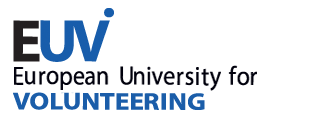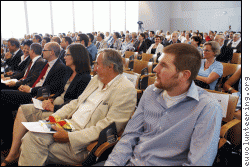SessionsEUV 2001-2011
Sixth Session of the EUV 2011, Basel, Switzerland"Volunteer work between freedom and professionalism". The International Year of Volunteers 2001+10 marked the end of a decade during which a lot of progress has been made in the field of volunteerism. There is a lot of research among volunteering and also the perception of volunteers and their management has changed within non-profit organizations. Frequently expressed reasons for this are professional trends, recruitment difficulties, increased expectations of volunteers and changed service offerings. While many places complain about a decline of volunteers, there is an increase in commitment elsewhere. Tensions arising between paid staff and volunteers, especially in the social care sector (and elsewhere) were studied, looking at fears of employees with regards to the reduction of jobs, on one hand, and overload of volunteers, on the other. These have both been identified as challenges for the successful design of volunteer programs. There are fears among employees of being replaced by "cheap" volunteers. These developments make it clear that volunteering is today in a tension between professionalization, on the one hand, and freedom, on the other. Organizers: CEPS (Center for Philanthropy Studies) of University of Basel, Schweizerische Gemeinnützige Gesellschaft, Christoph Merian Stiftung Basel, Evang.ref. und röm.kath. Kirchen, BaselStadt, Röm.kath. Kirche Baselland, Präsidialdepartement des Kantons BaselStadt, ICVolunteers joined forces to carry out the EUV 2011. Speakers: Dr. Guy Morin, Dr. Herbert Ammann, Joel Sames, Niggi Freundlieb, Dr. Goerg von Schnurrbein, Prof. Dr. Annemarie Pieper, Jean-Daniel Gerber, Peter Felber, among others. Conference Programme, German version Fifth session of the EUV 2005, Lucerne, SwitzerlandThe EUV held at the University of Lucerne focused on "Monetarism of volunteer work", meaning the influence payment and money has on volunteering and volunteerism. The congress looked at the evolution of society, where certain areas, so far covered by honorary and non paid individuals now have tendency to be remunerated. The general argument put forward is that it is necessary to have more professionalism. Among the points discussed during the conference was how volunteer work can be promoted and the direct or indirect monetary aspect this may encompass. Different measures were looked at, among which are the certification and documentation of volunteer work, tax deductions and more. Time banks were also mentioned. Leaders from the non-profit sector put increasingly forward the work experience aspect of volunteering, whether it is in the field or as part of directing boards. Generally speaking, it seemed that monetisation was increasingly a topic in our every-day-lives. The main question were: How is voluntary service recognised in different fields? What forms of recognition are practicable? What kind of bonus can be given to volunteers? What development concerning recognition in voluntary work is expected by volunteers? What rewards are desirable for volunteers? Where are the bottlenecks and problems? What developments would be desirable from the point of view volunteerism and volunteers? Are there incentives outside of this process, and which of them are adequate to encourage voluntary commitment to benefit the community? Behind all that stands the situation that monetarism is playing an increasing role in all kinds of voluntary services. The knowledge of the extent of the gratuity versus salary and the co-existence of volunteers and paid workers is a specific characteristic of non-profit entities. To treat this situation may create a dilemma and it is indeed a challenge of great interest, from a social, as well as from a economic point of view and it is not an easy task to analyse and to solve. Lectures and presentations in workshops were published. Organizers: The University of Lucerne, Schweizerische Gemeinnützige Gesellschaft Zürich and Migros-Genossenschafts-Bund Zürich, ICVolunteers joined forces to carry out the EUV 2005. Speakers: An inaugural message of greeting was given by Sebastián Masó, Rector of the EUV. Lectures were given by Herbert Ammann, Hansjörg Siegenthaler, Bear Bürgenmeier, Adalbert Evers and Laura Balbo. Conference Programme, German version Fourth session of the EUV 2001, Freiburg, Germany“Voluntary Service forms Europe: Cooperation in Theory and Practice”. Lectures were given by Lord Ralf Dahrendorf (London) about the contribution by the society of citizens to the shaping of Europe, Konrad Deufel (Hannover) about volunteering activities supporting civil societies, Alfred Grosser (Paris) about Voluntary service as cultural challenge and Leo Penta (New York / Berlin) about churches acting in society – international aspects. 300 participants from 26 countries attended the fourth meeting of the UEV in Freiburg; 30 persons came from 10 countries of Eastern Europe (eg. Russia, Baltic States, Georgia, Balkan States); there were also participants from the USA, Latin America and Africa. Organizing the UEV was the main activity and the international contribution of the German Caritas Association to the International Year of Volunteers 2001. In addition to lectures and seminars the participants also had a chance to visit in workshops various local volunteer projects. Experiences were exchanged with the help of examples taken from practice and research in several countries and this was reinforced with lectures about basic questions referring to honorary posts, volunteering and civil engagement. After that, results and consequences were shown for social practice in associations, for qualification of volunteers, and professionals at training places for social professions and for research at universities. All lectures and a selection of greetings, presentations and projects are published. Organizers: German Caritas Association, the Catholic University for Applied Sciences Freiburg, the Department for Religious Education at the Albert Ludwigs University of Freiburg. Speakers: Lord Ralf Dahrendorf (London), Konrad Deufel (Hannover), Alfred Grosser (Paris) and Leo Penta (New York / Berlin). Conference Programme, English version |


